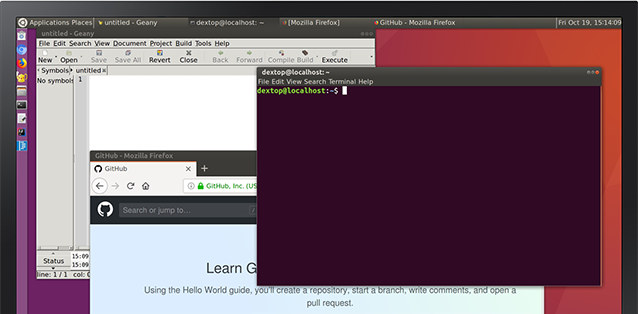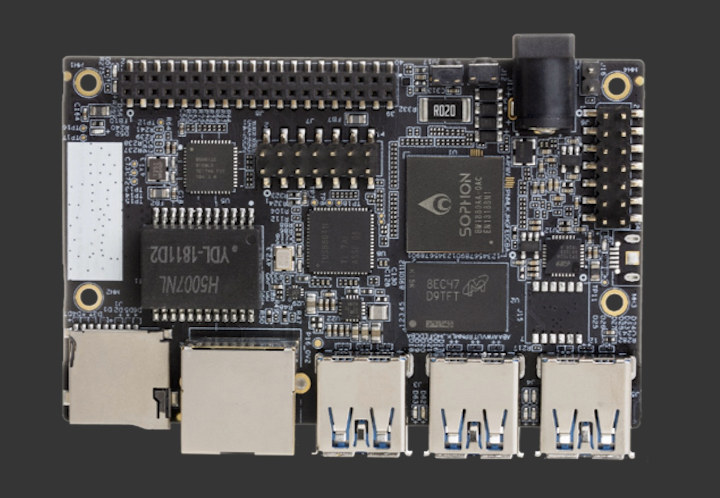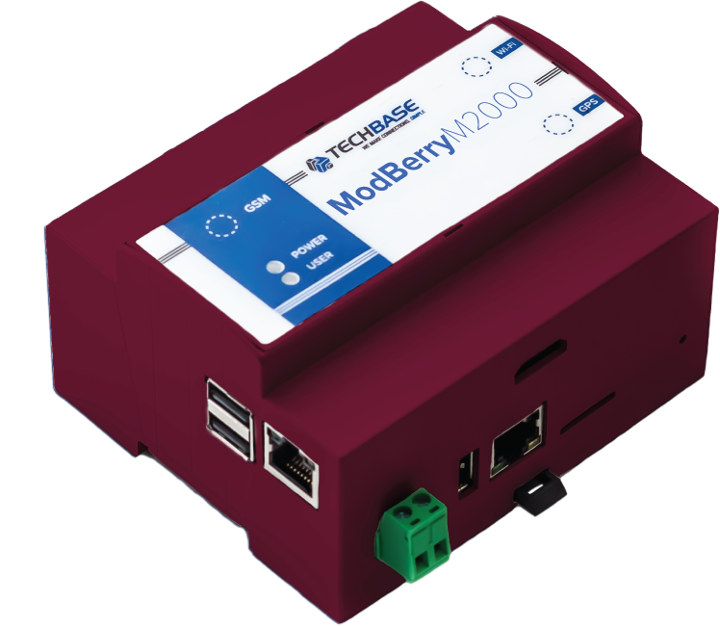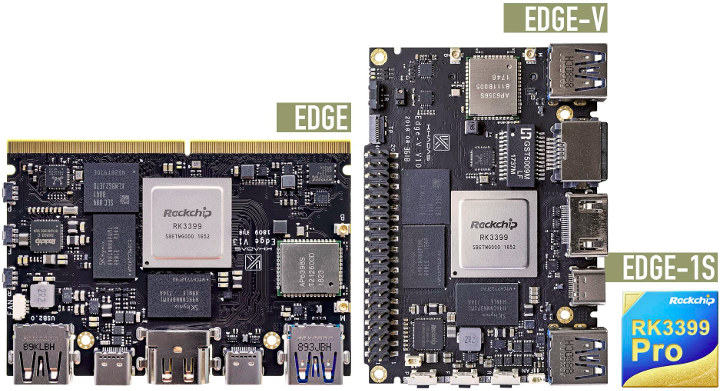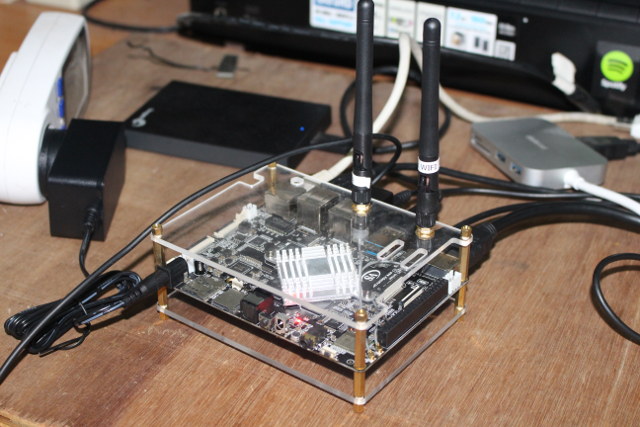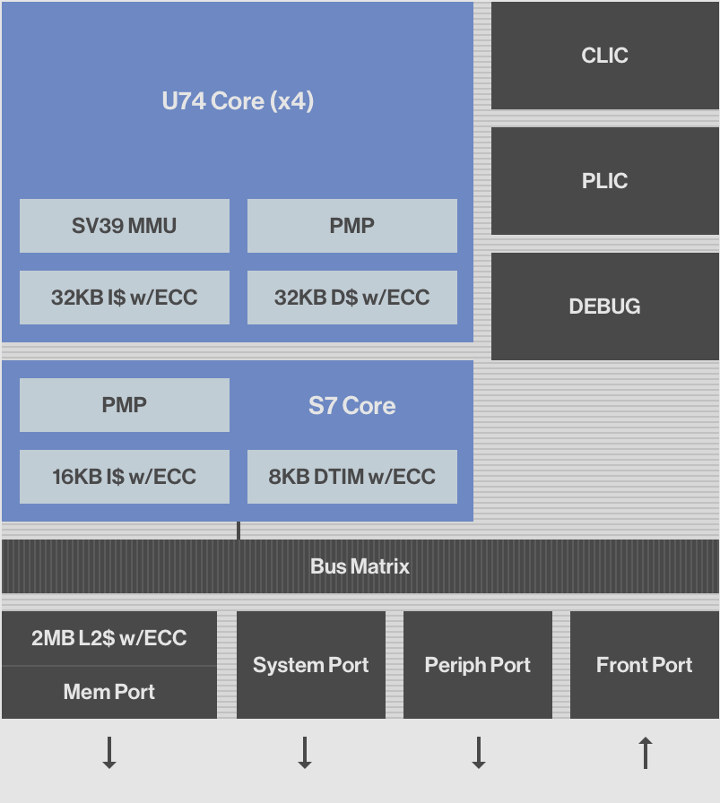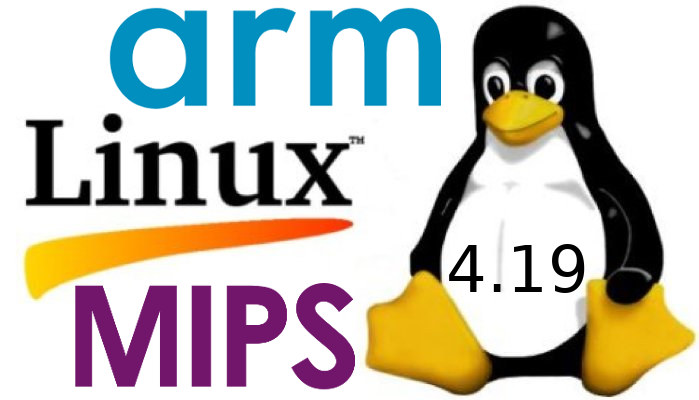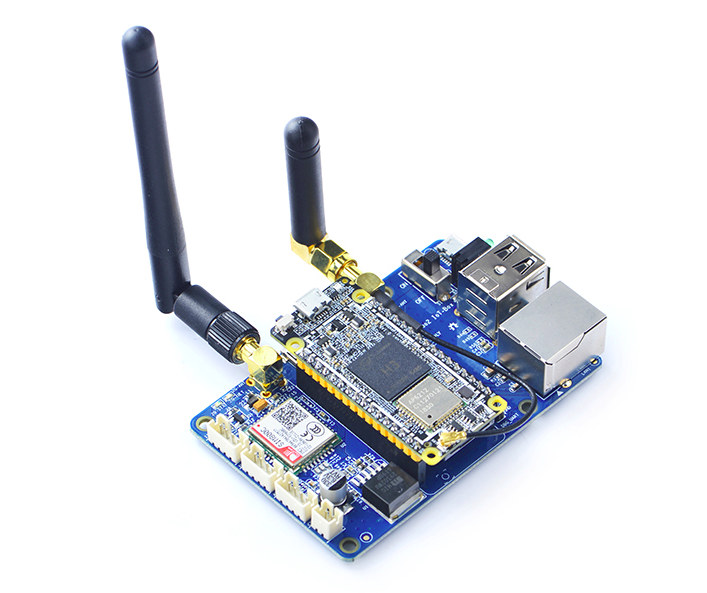Samsung unveiled “Linux on Galaxy” a little over a year ago with the aim of allowing developers to running Linux desktop on their high Galaxy smartphones coupled with DeX Station dock, keyboard, mouse and display. It was not quite ready for public consumption yet, so I registered to their mailing list to get more information in due time. This morning, I received an email with the subject “Register for the Linux on DeX beta trail” that reads in part: As an early adopter, you signed up for Linux on Galaxy at the Samsung Developer Conference (SDC) 2017. This service allows you to project a Linux development environment onto a desktop environment, complete with a monitor, keyboard, and mouse. So you can bring your code with you, wherever you go. This year, we have renamed the service Linux on DeX, and are beginning a private beta trial. Please visit our booth […]
96Boards AI Sophon Edge Developer Board Features Bitmain BM1880 ASIC SoC
Bitmain, a company specializing in cryptocurrency, blockchain, and artificial intelligence (AI) application, has just joined Linaro, and announced the first 96Boards AI platform featuring an ASIC: Sophon BM1880 Edge Development Board, often just referred to as “Sophon Edge”. The board conforms to the 96Boards CE specification, and include two Arm Cortex-A53 cores, a Bitmain Sophon Edge TPU delivering 1 TOPS performance on 8-bit integer operations, USB 3.0 and gigabit Ethernet. Sophon Edge specifications: SoC ASIC – Sophon BM1880 dual core Cortex-A53 processor @ 1.5 GHz, single core RISC-V processor @ 1 GHz, 2MB on-chip RAM, and a TPU (Tensor Processing Unit) that can provide 1TOPS for INT8,and up to 2 TOPs by enabling Winograd convolution acceleration System Memory – 1GB LPDDR4 @ 3200Mhz Storage – 8GB eMMC flash + micro SD card slot Video Processing – H.264 decoder, MJPEG encoder/decoder, 1x 1080p @ 60fps or 2x 1080p @ 30fps H.264 decoder, […]
ModBerry M2000 Industrial Computer Features UP Squared Apollo Lake Board
TECHBASE has been providing DIN rail mountable Arm and x86 based Modberry industrial computers / IoT gateways for several years. The company has now upgraded ModBerry M1000 model with an Intel Cherry Trail UP board to ModBerry M2000 computer featuring AAEON UP Squared board powered by either an Intel Celeron N3350 dual core processor, or Pentium N4200 quad core processor, both part of Intel’s Apollo Lake family. ModBerry M2000 specifications: SoC (one or other other) Intel Celeron N3350 dual core processor @ 1.10 / 2.40 GHz with Intel HD Graphics 500; 6W TDP Intel Pentium N4200 quad core processor @ 1.10 / 2.50 GHz with Intel HD Graphics 505; 6W TDP System Memory – 2, 4, or 8GB RAM Storage – 16, 32, 64, or 128GB eMMC flash, SATA connector and M.2 SATA socket Video Output – 1x HDMI Connectivity – 2x Gigabit Ethernet, with optional LTE/3G, WiFi, ZigBee, LoRa, […]
Khadas Edge RK3399/RK3399Pro Board Crowdfunding Campaign Launched
Khadas Edge is another upcoming Rockchip RK3399 board that we initially covered this summer, and comes with a particular design in the sense it is both a single board computer with USB and Ethernet port, and a system-on-module through its edge connector. Later on we found out, the company was working on a variant called Khadas Edge-V with the edge connector being replaced by a more standard 40-pin header, as well as Khadas Edge1S powered by Rockchip RK3399Pro for AI applications. The company has now launched the three boards and accessories through an Indiegogo crowdfunding campaign. I’ve already covered the two RK3399 boards in previous post, and the RK3399Pro based Khadas Edge-1S (2GB RAM, 2x MIPI-CSI, …) will be similar to Edge board but with , so instead I’ll have a closer look at the specifications for Khadas Captain carrier board for Khadas Edge / Edge-1S: Edge connector – 314-pin […]
Giveaway Week – Videostrong VS-RD-RK3399 Development Board
That’s the time of the year for another Giveway Week on CNX Software. They will be some development boards, add-on boards, and one gadget. You’ll have to keep reading this blog everyday to find out, but I’ll start with VideoStrong VS-RD-RK3399 development board and accessories. Also know as Mecool VS-RK3399, it is one of the many Rockchip RK3399 development board on the market. The board I have comes with 4GB LPDDR3, and 32GB eMMC flash, as well as all accessories above, minus the USB type-C cable which I can’t find anymore… A 12V/2A will also be provided in the kit given away. I reviewed the board with Debian, tested the SDK, and ran a few benchmarks in Linux about a year ago, and I found that while the board mostly worked as expected, software support and documentation needed some improvements. The SDK page is still there,but they have not really […]
SiFive Introduces 7 Series RISC-V Cores with E7, S7 and U7 series
SiFive has recently announced their Core IP 7 Series of RISC-V cores offering better performance, and designed to enable “embedded intelligence” in applications such as 5G, networking, storage, augmented reality, artificial intelligence, SLAM, and sensor fusion. Three families of the new 7 Series been launched with namely SiFive E7, S7 and U7 Core IP Series, so let’s have a look at each of them. E7 Core IP Series – E76 and E76-MC Cores The E7 Core IP Series comprises the 32-bit E76 and E76-MC (Multi-core), provides hard real-time capabilities, and compares to Arm’s Cortex M7, Cortex-R7/R8 cores. E76-MC Key Features Fully compliant with the RISC-V ISA specification 4x RV32IMAFC E76 Cores Machine and User Mode Support In-order, 8-stage pipeline Advanced Memory Subsystem 32KB Instruction Cache 32KB Instruction Tightly Integrated Memory (ITIM) 32KB Data Cache 32KB FIO RAM 256KB L2 Cache High-performance TileLink Interface Benchmark Scores- 2.3 DMIPS/MHz, 4.9 CoreMark/MHz E76 […]
Linux 4.19 Release – Main Changes, Arm and MIPS Architectures
With Linus Torvalds taking a leave from the Linux kernel project, Greg Kroah-Hartman was the one to release Linux 4.19 last Sunday: Hi everyone! It’s been a long strange journey for this kernel release… While it was not the largest kernel release every by number of commits, it was larger than the last 3 releases, which is a non-trivial thing to do. After the original -rc1 bumps, things settled down on the code side and it looks like stuff came nicely together to make a solid kernel for everyone to use for a while. And given that this is going to be one of the “Long Term” kernels I end up maintaining for a few years, that’s good news for everyone. A small trickle of good bugfixes came in this week, showing that waiting an extra week was a wise choice. However odds are that linux-next is just bursting so […]
Tiny NanoPi Duo2 Board Comes with WiFi, a Camera Interface, an Optional 2G-IoT Dock
NanoPi Duo was launched last year as an ultra-cheap ($8+) Arm Linux board that fits into a breadboard. The board was powered by Allwinner H2+ processor coupled with 256 or 512MB RAM, and the infamous XR819 802.11b/g/n WiFi chip. FriendlyElec has now launched NanoPi Duo2, that’s still breadboard compatible, but with a slightly longer form factor, Allwinner H3 processor, 512 MB RAM, better WiFi thanks to an AP6212 module, and an extra camera interface. As we’ll see further below the company also developed a carrier board for 2G cellular IoT applications. NanoPi Duo2 specifications with highlights in bold showing differences again NanoPi Duo: SoC – Allwinner H3 quad core Cortex A7 processor @ 1.2 GHz with Mali-400MP2 GPU System Memory – 512 MB DDR3 SDRAM Storage – micro SD card slot, footprint for SPI flash Connectivity – 802.11 b/g/n WiFi + Bluetooth 4.0 LE (Ampak AP6212 module) with chip antenna, […]


